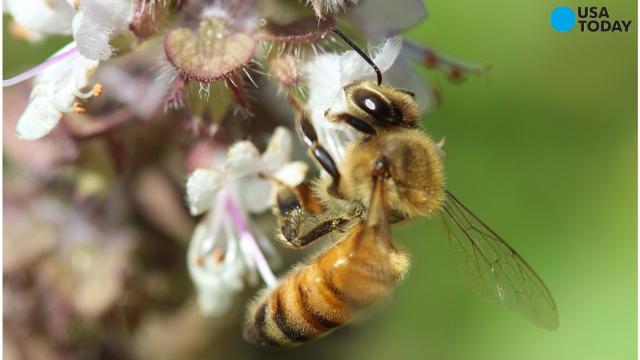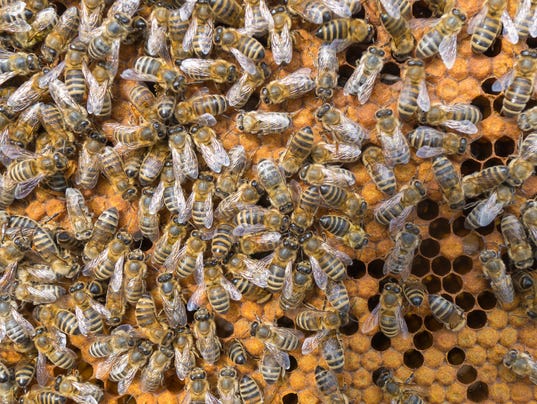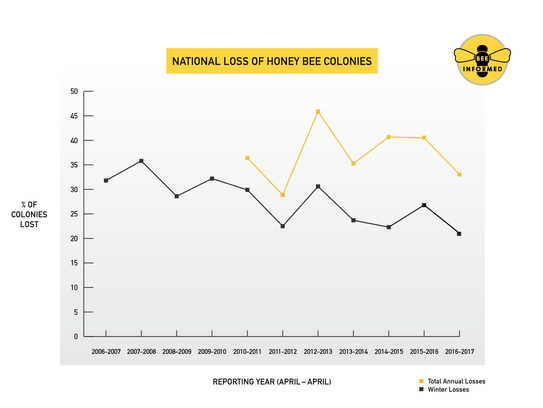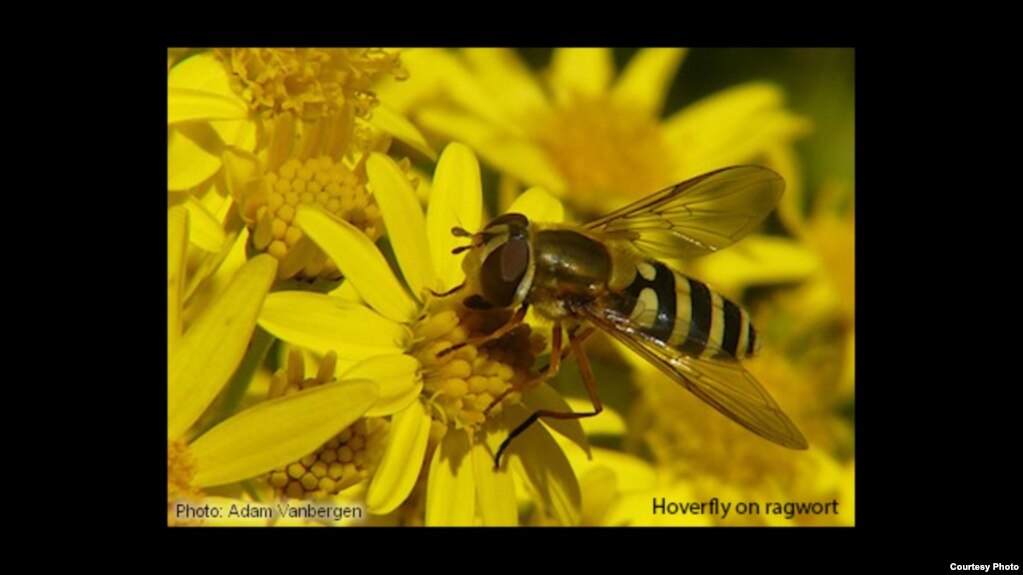Navigation
Install the app
How to install the app on iOS
Follow along with the video below to see how to install our site as a web app on your home screen.

Note: This feature currently requires accessing the site using the built-in Safari browser.
More options
You are using an out of date browser. It may not display this or other websites correctly.
You should upgrade or use an alternative browser.
You should upgrade or use an alternative browser.
The Bees
- Thread starter froggy
- Start date
This is not completely true the Israelis have come up with some unique ways to keep their bee population stable..One of the ways is to give the bees more variety in the plants they get to visit..In some places like the United States there are miles and miles and one type of plant or another that are not good for a stable bee population.. It just takes common sense to figure these things out. Further the Israelis are working on vaccines tailor made for bees to help them cope with viruses that affect them...Worse comes to worse the Israelis will not starve but I am sure they will share their knowledge freely with the rest of the world even though the rest of the constantly stings them in the back without removing their stinger...
Granny says, "Dat's right...
... it's the end times...
... like it says inna Bible...
... we all gonna die."
Of all the insects these are among my favorites, just like butterflies.
The kid a couple doors down is afraid of bees...
... Uncle Ferd tells him there's a bee with his name on it.
... it's the end times...
... like it says inna Bible...
... we all gonna die."
Of all the insects these are among my favorites, just like butterflies.
The kid a couple doors down is afraid of bees...
... Uncle Ferd tells him there's a bee with his name on it.
TheOldSchool
Diamond Member
- Banned
- #5
How Israel is saving the honeybeesThis is not completely true the Israelis have come up with some unique ways to keep their bee population stable..One of the ways is to give the bees more variety in the plants they get to visit..In some places like the United States there are miles and miles and one type of plant or another that are not good for a stable bee population.. It just takes common sense to figure these things out. Further the Israelis are working on vaccines tailor made for bees to help them cope with viruses that affect them...Worse comes to worse the Israelis will not starve but I am sure they will share their knowledge freely with the rest of the world even though the rest of the constantly stings them in the back without removing their stinger...
Bees still dyin' in droves...

1/3 of U.S. Honeybee Colonies Died Last Year
May 26, 2017 | America's beekeepers watched as a third of the country's honeybee colonies were lost over the last year, part of a decade-long die-off experts said may threaten our food supply.

1/3 of U.S. Honeybee Colonies Died Last Year
May 26, 2017 | America's beekeepers watched as a third of the country's honeybee colonies were lost over the last year, part of a decade-long die-off experts said may threaten our food supply.
The annual survey of roughly 5,000 beekeepers showed the 33% dip from April 2016 to April 2017. The decrease is small compared to the survey's previous 10 years, when the decrease hovered at roughly 40%. From 2012 to 2013, nearly half of the nation's colonies died. "I would stop short of calling this 'good' news," said Dennis vanEngelsdorp, an assistant professor at the University of Maryland. "Colony loss of more than 30% over the entire year is high. It's hard to imagine any other agricultural sector being able to stay in business with such consistently high losses." The research, published Thursday, is the work of the nonprofit Bee Informed Partnership and the Apiary Inspectors of America. The death of a colony doesn't necessarily mean a loss of bees, explains vanEngelsdorp, a project director at the Bee Informed Partnership. A beekeeper can salvage a dead colony, but doing so comes at labor and productivity costs.

An annual survey shows a third of America's bee colonies were lost over the past year, and over 10 years, the numbers are even more troubling
That causes beekeepers to charge farmers more for pollinating crops and creates a scarcity of bees available for pollination. It's a trend that threatens beekeepers trying to make a living and could lead to a drop-off in fruits and nuts reliant on pollination, vanEngelsdor said. One in every three bites of food, van Engelsdorp said, is directly or indirectly pollinated by honeybees, who pollinate about $15 billion worth of U.S. crops each year. Almonds, for instance, are completely reliant on honeybee pollination. "Keeping bees healthy is really essential in order to meet that demand," said vanEngelsdorp. He said there are concerns it won't.

U.S. beekeepers reported they lost 33% of their honey bee colonies over the past year.
So what's killing the honeybees? Parasites, diseases, poor nutrition, and pesticides among many others. The chief killer is the varroa mite, a "lethal parasite," which researchers said spreads among colonies. "This is a complex problem," said Maryland graduate student Kelly Kulhanek, who assisted with the study. "Lower losses are a great start, but it's important to remember that 33% is still much higher than beekeepers deem acceptable. There is still much work to do."

This summary chart shows the results of an 11-year annual survey that tracks honey bee colony losses in the United States, spanning 2006-2017.
vanEngelsdorp said people can do their part to save bee colonies by buying honey from a local beekeeper, becoming a beekeeper, avoiding using pesticides in your yard and making room for pollinators, such as honeybees, in your yard. "Bees are good indicators of the landscape as a whole," said Nathalie Steinhauer, who led data collection on the project. "To keep healthy bees, you need a good environment and you need your neighbors to keep healthy bees. Honeybee health is a community matter."
A third of the nation's honeybee colonies died last year. Why you should care
There is always an answer and one need not get pessimistic about it... Suppose in the future we create miniature robots that take over the bees jobs that work 24/7 never stop and actually increase pollination to an extreme so that we increase our productive plants and food sources what would you say then....
- Aug 18, 2009
- 12,484
- 2,651
- 245
- Thread starter
- #8
Here's why drones can't compete with beesThere is always an answer and one need not get pessimistic about it... Suppose in the future we create miniature robots that take over the bees jobs that work 24/7 never stop and actually increase pollination to an extreme so that we increase our productive plants and food sources what would you say then....
I remember when they said that computers would never surpass the human chess masters and yet here we are...The point is that there are other options and that if Gd forbid bees go the way of the dodo bird then something will take their place either man made or something from nature will fill the niche... After all nature abhors a vacuum and 99.9 per cent of the species have gone extinct and yet life continues and others come along and fill the space they occupied...
Some hope for bees...

Study Finds Mixed News About Bee Populations
May 26, 2017 - There’s a glimmer of hope for the American bee population. But, according to a new study, the outlook for this critical insect is mostly grim. Researchers report a slowing of the rate of decline in the bee population over the past year, dropping to its lowest since 2011-2012.

Study Finds Mixed News About Bee Populations
May 26, 2017 - There’s a glimmer of hope for the American bee population. But, according to a new study, the outlook for this critical insect is mostly grim. Researchers report a slowing of the rate of decline in the bee population over the past year, dropping to its lowest since 2011-2012.
But, both commercial and small-scale beekeepers lost 33 percent of their honey bee colonies between April 2016 and April 2017. "While it is encouraging that losses are lower than in the past, I would stop short of calling this 'good' news," said Dennis van Engelsdorp, an assistant professor of entomology at the University of Maryland and project director for the Bee Informed Partnership, in a summary of the study. "Colony loss of more than 30 percent over the entire year is high," he added. "It's hard to imagine any other agricultural sector being able to stay in business with such consistently high losses."

A new study shows that while American bee populations are still falling, they may have slowed.
Researchers point to many causes for the drop in bee populations, with parasites, particularly the varroa mite, and other diseases as the main culprits. Pesticides are also a factor, according to the study, particularly among commercial beekeepers. The researchers describes like a kind of synergy among all the causes that amount to worsening each individual problem. "This is a complex problem," said Kelly Kulhanek, a graduate student in the UMD Department of Entomology who helped with the survey. "Lower losses are a great start, but it's important to remember that 33 percent is still much higher than beekeepers deem acceptable. There is still much work to do."
The annual survey, which has been conducted for 11 years, aims to find why bee colonies are suffering, a problem that can have big consequences for human beings, given that honey bees pollinate $15 billion worth of U.S. agriculture annually. Almonds, researchers say are a perfect example: their growth is entirely dependent on bees for pollination. "Bees are good indicators of the health of the landscape as a whole," said Nathalie Steinhauer, a graduate student in the UMD Department of Entomology who leads the data collection efforts for the annual survey. "Honey bees are strongly affected by the quality of their environment, including flower diversity, contaminants and pests....Honey bee health is a community matter."
Study Finds Mixed News About Bee Populations
IsaacNewton
Gold Member
- Jun 20, 2015
- 17,308
- 3,697
- 290
Bees are one of the canaries in the mine. All species are in their own way. View them as another warning siren that is going off.
Something is wrong.
Something is wrong.
Similar threads
- Replies
- 58
- Views
- 669
- Replies
- 50
- Views
- 552
Latest Discussions
- Replies
- 4
- Views
- 5
- Replies
- 8
- Views
- 29
- Replies
- 9
- Views
- 31
Forum List
-
-
-
-
-
Political Satire 8083
-
-
-
-
-
-
-
-
-
-
-
-
-
-
-
-
-
-
-
ObamaCare 781
-
-
-
-
-
-
-
-
-
-
-
Member Usernotes 471
-
-
-
-
-
-
-
-
-
-
